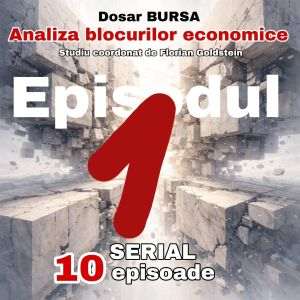Lucian Isar, economic analyst and former executive vice-president of Bancpost considers that the solution to help Romania resume growth is to focus on the real macroeconomy.
He said that the economy needs to be stimulated by lowering the minimum required reserves, by granting loans for investments, by raising the budget deficit and the amount made available for the guarantees granted by banks.
Lucian Isar claims that an increasing number of economists consider that a third pillar needs to be built, that of the real macroeconomy, which would offer a medium and long term outlook which would be viable for a sustainable economic growth. At present, the other two pillars that support economic growth are the low inflation and low fiscal deficits, but in the long run, this would only result in sub-optimal economic growth. These economic support axes are part of the economic model the IMF pushed in several countries, including Romania, the so-called "financial programming model".
In order to build the third pillar, the reserves denominated in lei need to be drastically cut, by cutting the interest rate on investment loans, the analyst considers. He said that the policy rate would have to be cut from 6.25% to 5.75%, which would allow banks to reduce the interest rate they charge.
Lucian Isar claims that the interest was one of the factors that sparked the financial crisis in Romania. According to him, in 2008, the interest rate policy was flawed, as the rate was set very high. Furthermore, if the key rate had been 6% in 2008, Romania would have exited the recession in 2009, but the interest rate was only cut in 2010.
In order to help the Romanian economy recover, Lucian Isar considers that the budget deficit and inflation should follow the "44 rule" (ed. note: a proprietary model) until 2015. The model in question proposes a deficit of 4%, in order to create a fiscal zone which would encourage investments and a inflation target of 4%.
The analyst also discussed the rise of food prices. In his opinion, this phenomenon occurred because Romania is not competitive in this sector and because there are a lot of middlemen in the market which are driving prices up. Concerning the seventh tranche received from the IMF, of 900 million Euros, the analyst considers that it was not necessary, as long the money are redirected towards the NBR"s reserves.
• According to Lucian Isar, the guarantees awarded to banks would have to be directed towards:
- a tranche-based structure, for guaranteeing the co-financing part in order to attract European funds
- creating multi-agent discount platforms which would attract various forms of capital (for instance, to unlock arrears)
- participating in financing of structures that would generate a multiplier effect in the economy, in other words concentrations that would generate interest from foreign or local investors, laboratories for public-private partnerships.

















































